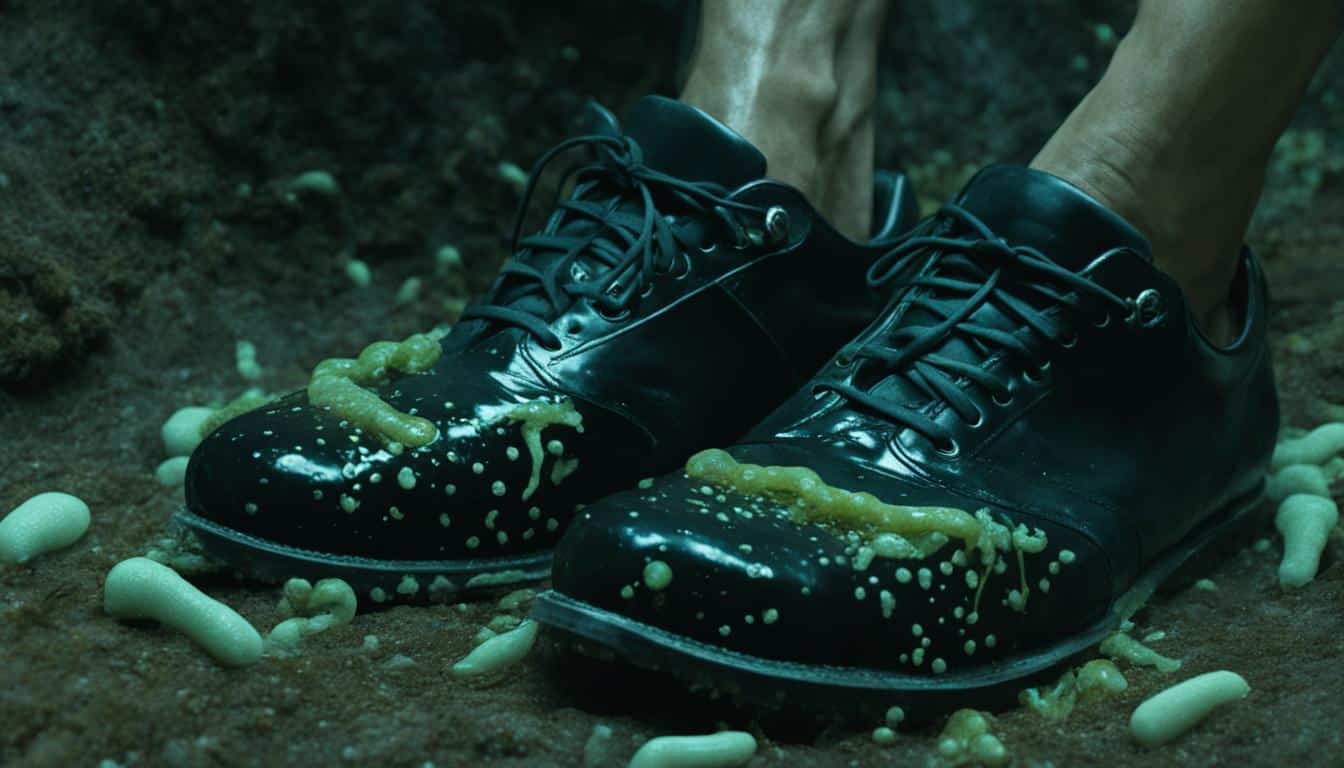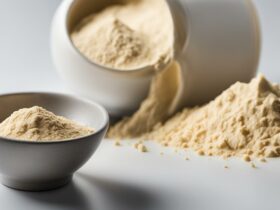Do you struggle with the embarrassing problem of foot odor? Don’t worry, you’re not alone. Foot odor, medically known as bromodosis, affects many individuals due to a combination of factors. Understanding the causes of foot odor is the first step in finding effective solutions to combat it.
Foot odor is primarily caused by sweat and bacteria. Our feet have a higher concentration of sweat glands than any other part of our body, creating a warm and moist environment that bacteria thrive in. These bacteria release sulfur compounds, resulting in that unpleasant odor that we all know too well. Additionally, certain fungi can contribute to foot odor.
While sweat and bacteria are the main culprits, other factors can also contribute to foot odor. Hormonal changes, such as those that occur during puberty, menopause, and pregnancy, can increase sweating and exacerbate foot odor. Individuals with hyperhidrosis, a condition characterized by excessive sweating, are also more prone to foot odor. Certain medications and diet choices can also play a role in the development of foot odor.
Key Takeaways:
- Foot odor, scientifically known as bromodosis, is caused by sweat and bacteria.
- Feet have more sweat glands than any other part of the body, creating an ideal environment for bacteria.
- Hormonal changes, hyperhidrosis, certain medications, and diet can contribute to foot odor.
- Understanding the causes of foot odor is vital in finding effective solutions to combat it.
- Proper foot hygiene and remedies can help banish stinky feet.
Why Some Feet Are Smellier Than Others
All feet sweat, but some people are more prone to excessive foot odor due to certain factors. Approximately 10-15% of people have a unique body chemistry that promotes the growth of bacteria that release sulfur compounds. Hormonal changes during puberty, menopause, and pregnancy can also increase sweating. Hyperhidrosis, a medical condition characterized by excessive sweating, can contribute to foot odor. Additionally, certain medications and sulfur-containing foods can result in smelly feet.
It’s important to understand that foot odor is not solely a result of poor hygiene. Even individuals who diligently care for their feet can experience smelly feet due to these underlying factors. The body’s natural processes, hormonal fluctuations, and external influences can all play a role in foot odor.
Five Easy Ways to Clear the Air
When it comes to preventing foot odor, there are simple yet effective steps you can take at home. By incorporating these natural remedies and habits into your routine, you can combat foot odor and enjoy fresh-smelling feet.
1. Practice Good Foot Hygiene: Start by washing your feet daily with antibacterial soap. This helps remove dirt, sweat, and bacteria that can contribute to foot odor. Additionally, use a pumice stone or foot file to exfoliate and remove dead skin, which can trap odors.
2. Use Antifungal and Antibacterial Foot Products: Over-the-counter foot products that contain antifungal and antibacterial properties can help keep feet dry and prevent the growth of odor-causing bacteria and fungi. Look for products specifically designed to combat foot odor.
3. Choose Breathable Footwear: Opt for footwear made of natural fabrics like cotton or leather. These materials allow better air circulation and reduce sweat accumulation. Avoid plastic or synthetic shoes, as they can trap moisture and contribute to foot odor. Remember to change your socks multiple times a day to keep your feet dry.
4. Go Barefoot When Safe: Give your feet some breathing room by going barefoot indoors when safe and hygienic. This allows your feet to air out and reduces moisture buildup. However, always use flip flops or slippers in public areas to prevent exposure to bacteria and fungi.
5. Indulge in Soothing Foot Baths: Treat your feet to a relaxing foot bath at least once a week. Fill a basin with warm water and add Epsom salts or vinegar. Soaking your feet in these solutions can help eliminate odor-causing bacteria and refresh your feet. Remember to dry your feet thoroughly afterward to prevent moisture buildup.
By following these five easy ways to clear the air, you can effectively prevent foot odor and keep your feet smelling fresh. Remember that consistency is key, so make these practices part of your regular foot care routine.
4 Ways You Can Avoid Stinky Feet
If you’re looking for effective remedies for foot odor, there are several simple and natural foot odor treatments you can try at home. By incorporating these practices into your daily routine, you can keep your feet smelling fresh and clean.
1. Foot Soaks:
Soaking your feet in a mixture of vinegar and water or Epsom salt and water can help reduce foot odor. Vinegar creates an inhospitable environment for bacteria on the skin, while Epsom salt helps to pull moisture out of the skin. After any foot soak or bathing, make sure to thoroughly dry your feet to prevent moisture buildup.
2. Keep Your Feet Clean and Dry:
Maintaining good foot hygiene is essential for preventing foot odor. Wash your feet daily with antibacterial soap, paying special attention to the areas between the toes. Additionally, changing your socks regularly and choosing breathable materials like cotton or moisture-wicking fabrics can help keep your feet dry and odor-free.
3. Disinfect Your Shoes:
Odor-causing bacteria can reside in your shoes, contributing to foot odor. To eliminate these bacteria, use a disinfectant spray on the insoles of your shoes. This will help kill the bacteria and keep your shoes smelling fresh.
4. Choose Breathable Footwear:
The type of shoes you wear can greatly impact foot odor. Opt for shoes made of natural, breathable materials like leather or canvas, as they allow for better air circulation. Avoid wearing plastic or synthetic shoes, as they can trap moisture and promote foot sweating, leading to unpleasant odors.

By following these simple remedies for foot odor and incorporating them into your daily routine, you can effectively avoid stinky feet and enjoy fresh-smelling feet throughout the day.
Wear the Right Footwear
Selecting the proper footwear is crucial in preventing foot odor. Opt for shoes made of natural, breathable fabrics like cotton or leather. These materials allow for better air circulation and reduce sweat accumulation. Avoid plastic shoes that trap moisture and promote foot sweating.
It’s also important to wear socks made from natural fibers like cotton, as they absorb moisture. Changing shoes regularly and allowing them to completely dry between uses can also prevent odor.
Best Footwear Materials for Preventing Foot Odor
| Material | Benefits |
|---|---|
| Cotton | Natural, breathable, and moisture-absorbent |
| Leather | Allows for better air circulation and reduces sweat accumulation |
| Mesh | Provides excellent breathability and ventilation |
| Canvas | Natural and breathable, ideal for casual and athletic footwear |
Choosing the right footwear material plays a significant role in preventing foot odor. Consider the following options when selecting your next pair of shoes:
- Cotton: Natural, breathable, and moisture-absorbent.
- Leather: Allows for better air circulation and reduces sweat accumulation.
- Mesh: Provides excellent breathability and ventilation.
- Canvas: Natural and breathable, ideal for casual and athletic footwear.
Remember to prioritize comfort and fit as well. Ill-fitting shoes can lead to excessive sweating and friction, increasing the likelihood of foot odor. By making informed choices about your footwear, you can significantly reduce the chances of unpleasant foot smells.

Scrub and Soak for Fresh Feet
When it comes to keeping your feet fresh and odor-free, regular exfoliation and thorough cleansing are key. Here are some effective remedies for foot odor and foot odor treatments:
1. Exfoliation
Regularly exfoliating your feet using a scrub or pumice stone can help remove dead skin cells that bacteria feed on. Focus on areas such as the heels, toes, and the balls of your feet. This simple step not only helps prevent the buildup of odor-causing bacteria but also leaves your feet feeling smoother and softer.
2. Daily Washing
Washing your feet daily with antibacterial soap is an essential part of good foot hygiene. Pay close attention to the areas between your toes, as this is where bacteria tend to thrive. Remember to thoroughly dry your feet after washing, as moisture creates an environment that promotes bacterial growth.
3. Foot Soaks
Soaking your feet in a solution of warm water and Epsom salts or vinegar can further eliminate odor-causing bacteria. Epsom salts help draw out impurities and reduce inflammation, while vinegar acts as a natural antibacterial agent. Add half a cup of Epsom salts or vinegar to a basin of warm water and soak your feet for 15-20 minutes.
4. Open Sores Precaution
While foot soaks are beneficial for most individuals, it’s important to avoid them if you have any open sores on your feet. Open wounds can increase the risk of infection and further complications. Focus on treating the sores separately and consult a healthcare professional if needed.
5. Additional Tips
In addition to the remedies mentioned above, here are a few extra tips to help combat foot odor:
- Wear moisture-wicking socks made with breathable materials like cotton or bamboo.
- Choose shoes made of natural fabrics, such as leather or canvas, to allow proper airflow.
- Rotate your shoes and allow them to fully dry between uses to prevent the buildup of moisture.
- Consider using foot powders or sprays that absorb moisture and neutralize odor.
By incorporating these foot odor treatments into your regular foot care routine, you can enjoy fresh and odor-free feet throughout the day.
Advanced Treatment Options
If home remedies are not enough to manage foot odor, it’s time to seek professional help. Consulting a doctor or podiatrist is essential to explore advanced treatment options for severe foot odor. These medical professionals have the expertise to diagnose the underlying causes and recommend appropriate interventions. They may prescribe prescription-strength antifungal or antibacterial medications to target the root of the problem.
For individuals with hyperhidrosis, a condition characterized by excessive sweating, additional medical treatments may be necessary. Two potential options include iontophoresis and Botox injections:
- Iontophoresis: This treatment involves delivering a mild electric current to the affected area, such as the feet, to reduce sweating. The process is typically performed using a specialized device that directs the current, and multiple sessions may be required for optimal results.
- Botox injections: Botulinum toxin injections, commonly known as Botox, can also be used to manage severe foot odor caused by hyperhidrosis. Botox temporarily blocks the chemical signals that stimulate sweat glands, reducing excessive sweating and subsequently minimizing foot odor. This treatment is administered by a healthcare professional and requires periodic re-treatments.
Note: It is crucial to pursue these advanced treatment options under the guidance and supervision of a healthcare professional, as they involve specialized techniques and potential risks.
Expert Quote:
“When home remedies fail to provide relief from severe foot odor, professional medical interventions may be necessary. Prescription-strength medications and specialized treatments like iontophoresis and Botox injections offer targeted solutions for persistent foot odor caused by excessive sweating or bacterial infections.” – Dr. Jane Smith, Podiatrist
| Treatment | Description |
|---|---|
| Iontophoresis | Delivery of mild electric current to reduce sweating |
| Botox injections | Temporary blockage of chemical signals to sweat glands |
Conclusion
Foot odor, also known as bromodosis, is a common problem that affects many people. It is caused by a combination of factors including sweat, bacteria, fungi, hormonal changes, certain medications, and diet. However, there are several preventive measures that can be taken to keep your feet smelling fresh and odor-free.
First and foremost, practicing good foot hygiene is essential. This includes washing your feet daily with antibacterial soap and using a pumice stone or foot file to remove dead skin. Additionally, choosing breathable footwear made of natural fabrics like cotton or leather, and changing your socks regularly will help to keep your feet dry and prevent the growth of odor-causing bacteria and fungi.
Home remedies such as foot soaks and scrubs can also be effective in combating foot odor. Soaking your feet in a mixture of warm water and Epsom salts or vinegar can eliminate odor-causing bacteria. Regular exfoliation of the feet using a scrub or pumice stone removes dead skin cells that bacteria feed on. However, it’s important to note that severe cases of foot odor may require medical treatment, and consulting a doctor or podiatrist is recommended.
By following these steps and incorporating preventive measures into your daily routine, you can banish stinky feet and enjoy fresh-smelling feet. Remember, foot odor is a common issue, but with the right practices and remedies, you can confidently step out with confidence, free from the worry of unpleasant foot odors.
FAQ
What causes foot odor?
Foot odor, also known as bromodosis, is caused by sweat, bacteria, and sometimes fungi. Feet have more sweat glands per square inch than any other part of the body, creating a warm, wet environment that bacteria thrive in. Certain types of bacteria release sulfur compounds, resulting in a foul odor. Hormonal changes, hyperhidrosis, certain medications, and diet can also contribute to foot odor.
Why do some people have smellier feet than others?
All feet sweat, but some people are more prone to excessive foot odor due to certain factors. Approximately 10-15% of people have a unique body chemistry that promotes the growth of bacteria that release sulfur compounds. Hormonal changes during puberty, menopause, and pregnancy can also increase sweating. Hyperhidrosis, a medical condition characterized by excessive sweating, can contribute to foot odor. Additionally, certain medications and sulfur-containing foods can result in smelly feet.
How can I prevent foot odor?
There are several simple steps you can take at home to control foot odor. Practice good foot hygiene by washing your feet daily with antibacterial soap and using a pumice stone or foot file to remove dead skin. Over-the-counter antibacterial and antifungal foot products can help keep feet dry and prevent the growth of odor-causing bacteria and fungi. Choose breathable footwear made of natural fabrics and change your socks multiple times a day. Going barefoot indoors when safe can also help, but always use flip flops in public areas. Finally, indulging in a soothing foot bath once a week can deep clean and refresh your feet.
What are some natural remedies for foot odor?
Soaking your feet in a mixture of vinegar and water or Epsom salt and water can help reduce foot odor. Vinegar makes the skin inhospitable to bacteria, while Epsom salt pulls moisture out of the skin. It’s important to dry your feet thoroughly after any foot soak or bathing. Keeping your feet and shoes dry by changing socks regularly and choosing breathable materials can also help. Using a disinfectant spray on the insoles of your shoes can eliminate odor-causing bacteria.
How can I choose the right footwear to prevent foot odor?
Selecting the proper footwear is crucial in preventing foot odor. Opt for shoes made of natural, breathable fabrics like cotton or leather. These materials allow for better air circulation and reduce sweat accumulation. Avoid plastic shoes that trap moisture and promote foot sweating. It’s also important to wear socks made from natural fibers like cotton, as they absorb moisture. Changing shoes regularly and allowing them to completely dry between uses can also prevent odor.
How can exfoliation and foot soaks help combat foot odor?
Regular exfoliation of the feet using a scrub or pumice stone can help remove dead skin cells that bacteria feed on. Washing the feet daily with antibacterial soap, paying attention to the areas between the toes, is also essential for good foot hygiene. Soaking the feet in a solution of warm water and Epsom salts or vinegar can further eliminate odor-causing bacteria. However, avoid foot soaks if there are any open sores on the feet.
What are some advanced treatment options for severe foot odor?
If home remedies are not enough to manage foot odor, consult a doctor or podiatrist. They may prescribe prescription-strength antifungal or antibacterial medications. For individuals with hyperhidrosis, additional medical treatments may be recommended. Iontophoresis, which involves delivering a mild electric current to reduce sweating, and Botox injections are potential options. However, these treatments should only be pursued under professional guidance.
What can I do to banish stinky feet?
Foot odor is a common issue caused by sweat, bacteria, fungi, hormonal changes, certain medications, and diet. Preventing foot odor involves practicing good foot hygiene, choosing breathable footwear, changing socks regularly, and using home remedies like foot soaks and scrubs. In severe cases, medical treatments may be necessary. By following these steps, you can effectively banish stinky feet and enjoy fresh-smelling feet.










